Key Points
-
IMF praises Nigeria’s reforms but flags debt and oil concerns.
-
Cardoso says inflation is falling and reserves rising.
-
Nigeria pledges to sustain reforms and boost job creation.
Nigeria drew both praise and concern at the 2025 Annual Meetings of the International Monetary Fund (IMF) and World Bank in Washington D.C.
The IMF commended the government’s reform efforts but warned that rising debt costs and oil revenue risks could threaten the country’s recovery if not managed carefully.
The IMF’s latest World Economic Outlook upgraded Nigeria’s 2025 growth forecast from 3.4 to 3.9 percent, crediting stronger domestic fundamentals, improved oil output, and renewed investor confidence.
The Fund described the progress as promising but stressed that fiscal stability remains fragile.
IMF urges tighter discipline
Abebe Selassie, Director of the IMF’s African Department, acknowledged Nigeria’s policy progress, including exchange rate unification and fuel subsidy removal.
He said the next phase of reform must focus on policy consistency, better debt management, and more efficient revenue collection.
“Nigeria’s policy reforms have been significant. But sustaining these gains depends on discipline and transparency,” Selassie said.
The IMF’s Fiscal Monitor warned that Nigeria’s fiscal deficit could widen from 2.9 percent of GDP in 2025 to 3.7 percent in 2026 due to high interest payments and spending pressures.
Public debt, currently estimated at 39.3 percent of GDP, could ease slightly if borrowing remains contained.
Davide Furceri, of the IMF Fiscal Affairs Department, said the priority must be to improve spending quality and expand non-oil revenue.
“Debt servicing is crowding out investments in health, education, and infrastructure,” he said.
Cardoso defends reforms
Central Bank Governor Olayemi Cardoso led Nigeria’s delegation and reaffirmed that the government will stay the course despite social pressures. “We will not allow reform fatigue to set in,” he said.
Cardoso reported that headline inflation, which peaked above 30 percent in 2024, dropped to 18.02 percent in September.
He said the naira has stabilised across markets, foreign reserves now exceed $43 billion, and investor confidence is rising.
“Our policies are working,” he said. “Monetary tightening and fiscal coordination are beginning to rebalance public finances and restore credibility.”
Cardoso also announced that Nigeria has maintained a trade surplus of about six percent of GDP, driven by export diversification.
“For the first time in a long while, we have a positive balance of trade,” he said.
He confirmed that the CBN’s bank recapitalisation programme and partnership with fintech firms aim to strengthen Nigeria’s financial system.
“Innovation and regulation must progress together,” he said. “Our fintechs are ambassadors of Nigeria’s creativity.”
IMF sees fragile progress
The IMF’s Research Department said Nigeria’s rebound is real but still vulnerable.
It projected inflation to ease to 23 percent in 2025 and 22 percent in 2026, supported by tighter monetary coordination and a flexible exchange rate.
Tobias Adrian, IMF Financial Counsellor, called Nigeria’s currency reform a “difficult but necessary correction.”
He said a transparent exchange system can strengthen competitiveness and attract investment.
Selassie added that lower oil prices remain a major risk. He urged Nigeria to expand its tax base, modernise its collection systems, and ensure citizens see visible improvements in public services.
At a civil society forum, IMF Managing Director Kristalina Georgieva praised Nigeria’s push to curb illicit financial flows.
“Tracing illicit financial flows can help plug leakages that undermine growth,” she said.
“We’re supporting countries to strengthen oversight through technology and capacity building.”
Focus on jobs and inclusion
Minister of State for Finance, Dr. Uzoka-Anite, said the government is translating macroeconomic stability into real-sector growth.
She said reforms are already driving investment in infrastructure, agriculture, and digital enterprise.
“With stronger revenues, we’re investing in sectors that create jobs for young people and women,” she said.
Africa’s digital leap
At a separate session on Artificial Intelligence and productivity, Tony Elumelu, Chairman of UBA and Heirs Holdings, urged African leaders to seize the AI opportunity.
“Productivity is not just about worker output. It’s about opportunity per person,” he said.
“With the right infrastructure and access to capital, Africa can leapfrog through AI.”
He warned that poor regulation could deepen inequality. “Let’s make sure AI spreads prosperity instead of concentrating it,” he said.
The outlook
Cardoso summed up Nigeria’s participation at the meetings with cautious optimism. “Our story is one of resilience,” he said.
“We’re aligning courage with conviction to build a more competitive and inclusive economy.”
Georgieva agreed that the country is moving in the right direction. “The reforms are difficult, but they’re essential,” she said.
“Staying the course will decide how much of today’s progress becomes jobs and prosperity for Nigerians.”



